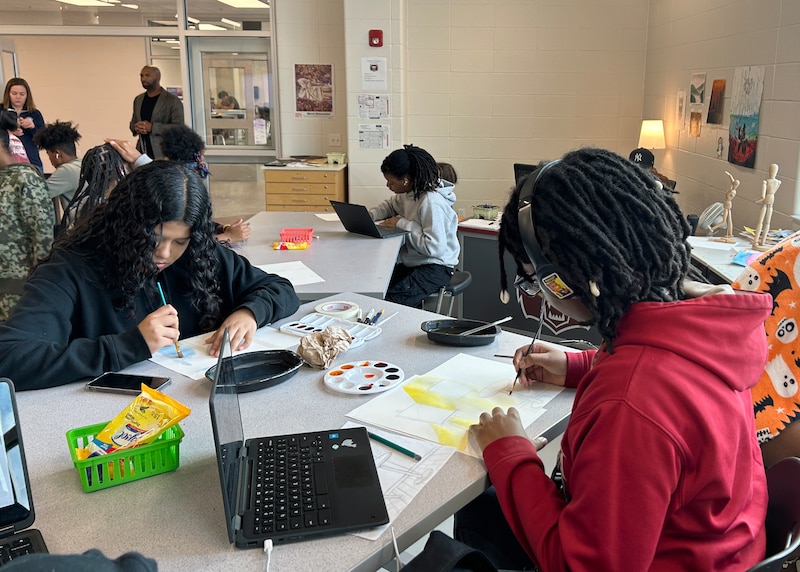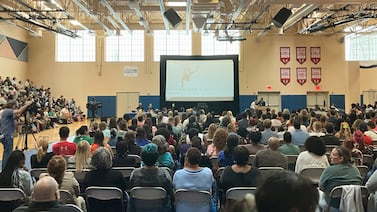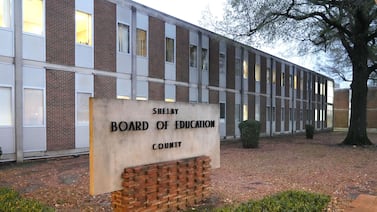Sign up for Chalkbeat Indiana’s free daily newsletter to keep up with Indianapolis Public Schools, Marion County’s township districts, and statewide education news.
When he considers future budgets for Wayne Township schools, Superintendent Jeff Butts knows times are about to get tougher. But he’s also grateful for what didn’t happen.
“There’s always that mantra of it’s better than it could’ve been, not as bad as it initially was,” he said.
Marion County school districts will soon receive more money from the state but lose millions in local tax revenue, creating a funding gap that could affect operations and student services, including building maintenance and bus replacement.
With the threat of a recession looming, schools in Marion County only received modest increases from lawmakers this year to their two-year education budgets. And district leaders are still dissecting what sweeping property tax reform will mean in the near future.
At the same time, district leaders like Butts feel grateful to have avoided deeper cuts in a year when state budget forecasts drove big reductions in other areas.
The 11 traditional public school districts in Marion County are projected to see an increase of $75.1 million in state funding over the next two years, according to an analysis of Indiana House Republicans’ projections by WFYI, Chalkbeat Indiana, and Mirror Indy.
That amounts to about a 2% increase across the county each year — but that’s not distributed evenly. The districts’ increases range from 1.1% to 4.4% in the upcoming school year across Marion County. Seven districts are projected to receive less than the 2.4% year-over-year increase in the inflation rate.
Even as state funding ticks up, districts in Marion County are expected to lose a total of $40.4 million in local property tax revenue in 2026 and 2027 — a critical funding source for transportation, facilities, and utilities. Because Indiana law limits transfers between the education fund, which includes state dollars, and the operating fund, which includes property tax revenue, leaders say they’ll now have to make hard decisions about what types of building maintenance and repairs to take on — and when to do those projects.
The new fiscal environment has also left some district leaders feeling cautious about future spending on everything from employee raises to new construction projects.
Tax changes will cut local revenue for schools
Indiana’s traditional public schools are primarily funded in two ways: state support in the form of per-student funding, and local property taxes. Each type of funding is designated for specific needs — state dollars cover classroom instruction, while local taxes support operations like transportation and building maintenance.
The bulk of state funding comes through the tuition support formula, which allocates money based on student enrollment at each district. Districts receive a foundation grant per student, plus additional funds through complexity grants for students from low-income families. The state also provides targeted grants for special education, career and technical programs, and academic honors.
In the newly approved state budget for 2025-26 and 2026-27, total K-12 funding increased by 2% each year, but not all of that money goes to traditional public schools. Charter schools and the private school voucher program are also supported from the same funding pool.
Districts with large funding gains are the ones projected to enroll more students overall, or more students requiring additional services, like students with disabilities.
State student funding for Franklin Township is estimated to grow by nearly 8% over the next two years. During the same time, funds for the Non-English Speaking Program will increase by nearly 24%.
At Indianapolis Public Schools, the county’s largest district, the state’s per-student funding will grow by an average of about 2% each year.
In Warren Township, state funding is estimated to inch up by 3.2% through mid-2027. Superintendent Tim Hanson said the district’s enrollment has stayed flat for about five years and “in this environment, flat enrollment is not a good thing.” While he said he feels fortunate the district didn’t take deeper cuts, he said enrollment is going to be a big focus for the district going forward.
In addition to state funds, local property taxes paid by homeowners and businesses flow into the operations fund and debt service fund, which pay for buses, utilities, and school maintenance and construction.
But property tax relief pushed by Gov. Mike Braun and approved by lawmakers will reduce that revenue stream. The measure, known as Senate Enrolled Act 1, gives homeowners a credit on their homestead property tax bills, with additional credits for veterans, seniors with disabilities and others.

As a result, Beech Grove City Schools are expected to lose 3.7% of local funds in 2026 and 5.4% in 2027 — the most of all Marion County districts.
Butts, the Wayne Township superintendent, said that while his district “will see modest increases in our property tax revenue, they’re not nearly where they would have been without the language of Senate Bill 1.”
Another change to school funding is coming in 2028. That’s when traditional public schools will be required to share property tax revenue with charter schools. The change is expected to direct about $4.7 million to charter schools across the state in the first year, according to the nonpartisan Legislative Services Agency.
Unlike traditional districts, most charter schools have not historically received local property tax funding. But a law passed two years ago requires districts in Marion County to share a small amount of property taxes with eligible charter schools.
The changes are expected to reduce all local school district funding by $408 million in Indiana over the next two calendar years, based on what schools would have received under the current law.
Marion County districts start planning for funding loss
Several district leaders said they and their staff are still working to understand what the funding changes mean for their districts. While some of them said it’s too early to know exactly how they’ll respond, they stressed their dedication to students and families.
“We will continue to strive to be a district of destination, welcoming all families who seek a high-quality public education for their child,” said Dana Altemeyer, spokesperson for Lawrence Township Schools.
Kirk Farmer, chief financial officer for MSD of Decatur Township schools, told the school board in May that school districts don’t know the effect of changes to property taxes because the new law affects each parcel of property differently.
“We have to realize it’s going to be a substantial change in the way that schools are funded and how funds flow to school districts,” Farmer said, noting that Decatur is in a “significantly strong” position to navigate the challenges.
Other school leaders gave a glimpse into the topics they are thinking about as they review the effect of these funding changes
In Wayne Township, Butts said the district has already slowed spending after COVID relief funds ended. And due to new tariff policies, he’s expecting school buses and building materials to increase in cost too.
Plus, Butts said the modest increases in tuition support will make teacher contract negotiations challenging this year.
“We definitely need to look at ways that we can increase compensation for our teachers as we look forward, but with 1.1% and 1.3% increases, that’s going to be pretty hard to do,” he said.
As Warren Township schools plan for the years ahead, Hanson, the superintendent, said he’s focused on three things: protecting student learning, preventing layoffs and operations that are safe and sustainable.
At the Warren school board meeting in April, the district’s chief financial officer Matt Parkinson said officials are preparing to evaluate how new restrictions on when schools can issue debt will affect future construction projects.
The district already shares more than $100,000 with charter schools under existing law, and expects that to grow as new property tax sharing phases in over time.
“This creates a new moment for us in terms of how we operate and some of the decisions that we’re going to have to make,” Parkinson said during the April meeting. “We’re in a strong place financially, but it’s going to be a new challenge.”
Lawmakers will begin to plan for the next two-year budget in the 2027 legislature.
Chalkbeat Indiana reporter Amelia Pak-Harvey and WFYI reporter Sydney Dauphinais contributed to this article.
Mirror Indy reporter Carley Lanich covers early childhood and K-12 education. Contact her at carley.lanich@mirrorindy.org or follow her on X @carleylanich.
MJ Slaby oversees Chalkbeat Indiana’s coverage as bureau chief. Contact MJ at mslaby@chalkbeat.org.
Eric Weddle is WFYI’s education team editor. Contact Eric at eweddle@wfyi.org or follow him on X at @ericweddle.





